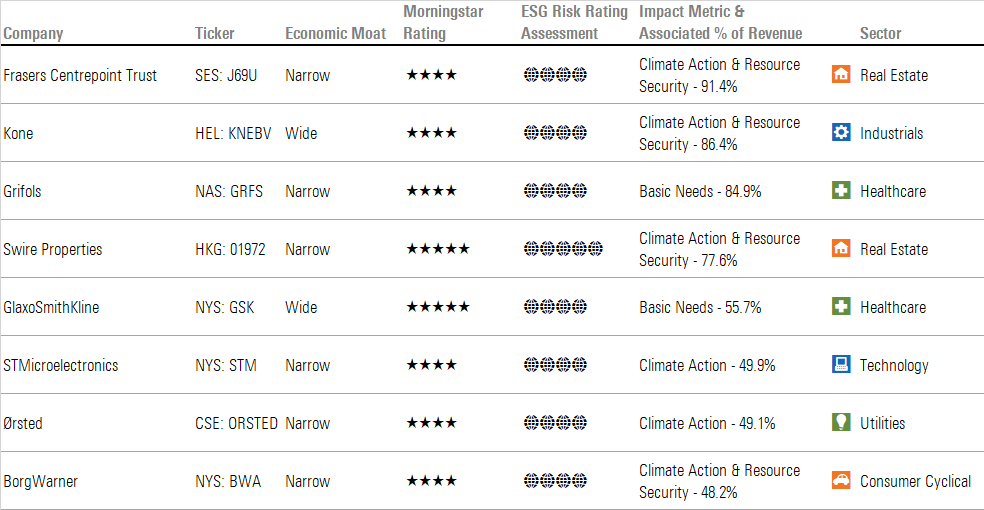8 Stocks for Impact-Minded ESG Investors
Yes, valuation and values can overlap; we see solid long-term opportunities in Glaxo, STMicro, and BorgWarner.

Over the past two months, I’ve looked at ways to combine ESG risk and traditional investing metrics like valuation and competitive advantage, including (perhaps counterintuitively) screens for stocks that bear higher environmental, social, and governance risk.
But it’s worth examining an obvious method to incorporate sustainability into investing: finding companies practicing strong sustainable practices that are also solid long-term investment opportunities.
In September 2022, I outlined a way to think about these stocks: Looking for companies with low ESG risk, with revenues that are strongly aligned to United Nations Sustainable Development Goals, and that also scored well on investment metrics. Not surprisingly, having low ESG risk and high impact isn’t necessarily a recipe for durable competitive advantage or an attractive stock. At the time, only three companies met our criteria for attractive ESG credentials and traditional investment chops. That’s a pretty paltry number, since we cover more than 1,500 companies globally at Morningstar.
But, as Warren Buffett has noted, long-term investors can wait for ideal opportunities. Admittedly, the scenario isn’t perfect, but eight companies now meet our criteria. First, they need to have 50%-plus of revenue aligned to at least one of five Impact Themes tracked by Morningstar Sustainalytics. For the screen below, we looked for companies that have:
- Morningstar Economic Moat Rating of narrow or wide
- Morningstar Rating of 4 or 5 stars
- ESG Risk Rating of Low or Negligible
- Revenue alignment to Impact Themes of approximately 50% or more
The companies are U.S.-listed stocks Grifols GRFS, GlaxoSmithKline GSK, STMicroelectronics STM, and BorgWarner BWA, along with international names like Frasers Centrepoint Trust J69U, Kone KNEBV, Swire Properties 01972, and Orsted ORSTED.

ESG: Buyer (and Seller) Beware
The list above includes companies across several sectors—industrials, utilities, and auto parts (BorgWarner)—that may not immediately spring to mind when thinking about sustainability. But this shows that opportunities sometimes lie in unexpected areas.
Finding positive sustainability credentials where we least expect them also reinforces the confusion that often exists in the ESG landscape. It’s often full of jargon, acronyms that will make your head spin, and conflation between matters of risk and impact.
Sometimes, it seems financial product providers can get caught up in the commotion, too. While we’ve already seen regulators in Europe and the United States crack down on misleading ESG claims, the latest example comes from Australia. Mercer’s Sustainable Plus superannuation retirement product (similar to the 401(k) in the U.S.) is under investigation by the local regulator for greenwashing. The regulator claims that the group’s several Sustainable Plus investment options claimed to exclude several industries, including carbon-intensive fossil fuels, but don’t appear to have actually followed through: They have holdings in coal and gas companies.
This is a good lesson in the importance of education—both for investors and providers. For investors, it is critical to know what you’re purchasing. Not all ESG strategies are equal. Some may rely on exclusions, some on engagement, some on different ratings systems. You can’t assume that just because a fund has “ESG” or “sustainable” in its name that it will reflect your own individual ESG preferences.
But financial product providers should ensure transparency, as well. A review of Mercer’s Investment Policy document describes the exclusions of the Sustainable Plus fund deep in the document—on the ninth paragraph of Page 11. Then it makes the following caveat: “Where Mercer is invested in a collective investment scheme or fund in which its assets are pooled with others, it may not be able to dictate these exclusions.”
Being upfront, open, and clear in each product’s offering is a general best practice but perhaps even more so in the evolving ESG world.
ESG and Politics Continue to Overlap—Strive Co-Founder’s Presidential Bid
This best practice goes for non-ESG focused funds, as well. For instance, Strive US Energy ETF DRLL—cofounded by recent U.S. presidential candidate Vivek Ramaswamy—faces its own share of criticism.
DRLL was marketed upon its August 2022 launch as free of “social agendas imposed by large ESG-linked asset managers.” It’s an expensive proposition. The fund charges 41 basis points for operating expenses, 4 times more than Energy Select Sector SPDR ETF XLE. For all those extra fees, 84% of DRLL’s portfolio overlaps heavily with XLE. And those anti-ESG investors may be surprised to find renewable energy companies such as Sunrun RUN in the portfolio. While a focus on valuation over values may align with some investors’ preferences, it’s critical to understand the price necessary to achieve these results.
The author or authors own shares in one or more securities mentioned in this article. Find out about Morningstar’s editorial policies.

/s3.amazonaws.com/arc-authors/morningstar/35091ad9-8fe9-4231-9701-578ec44b5def.jpg)
/cloudfront-us-east-1.images.arcpublishing.com/morningstar/CFV2L6HSW5DHTFGCNEH2GCH42U.jpg)
/cloudfront-us-east-1.images.arcpublishing.com/morningstar/7JIRPH5AMVETLBZDLUSERZ2FRA.png)
/cloudfront-us-east-1.images.arcpublishing.com/morningstar/YWKBIVULT5DGJEIGAJGBA6H5ZA.png)
:quality(80)/s3.amazonaws.com/arc-authors/morningstar/35091ad9-8fe9-4231-9701-578ec44b5def.jpg)